Monocef 250 mg Injection 1's
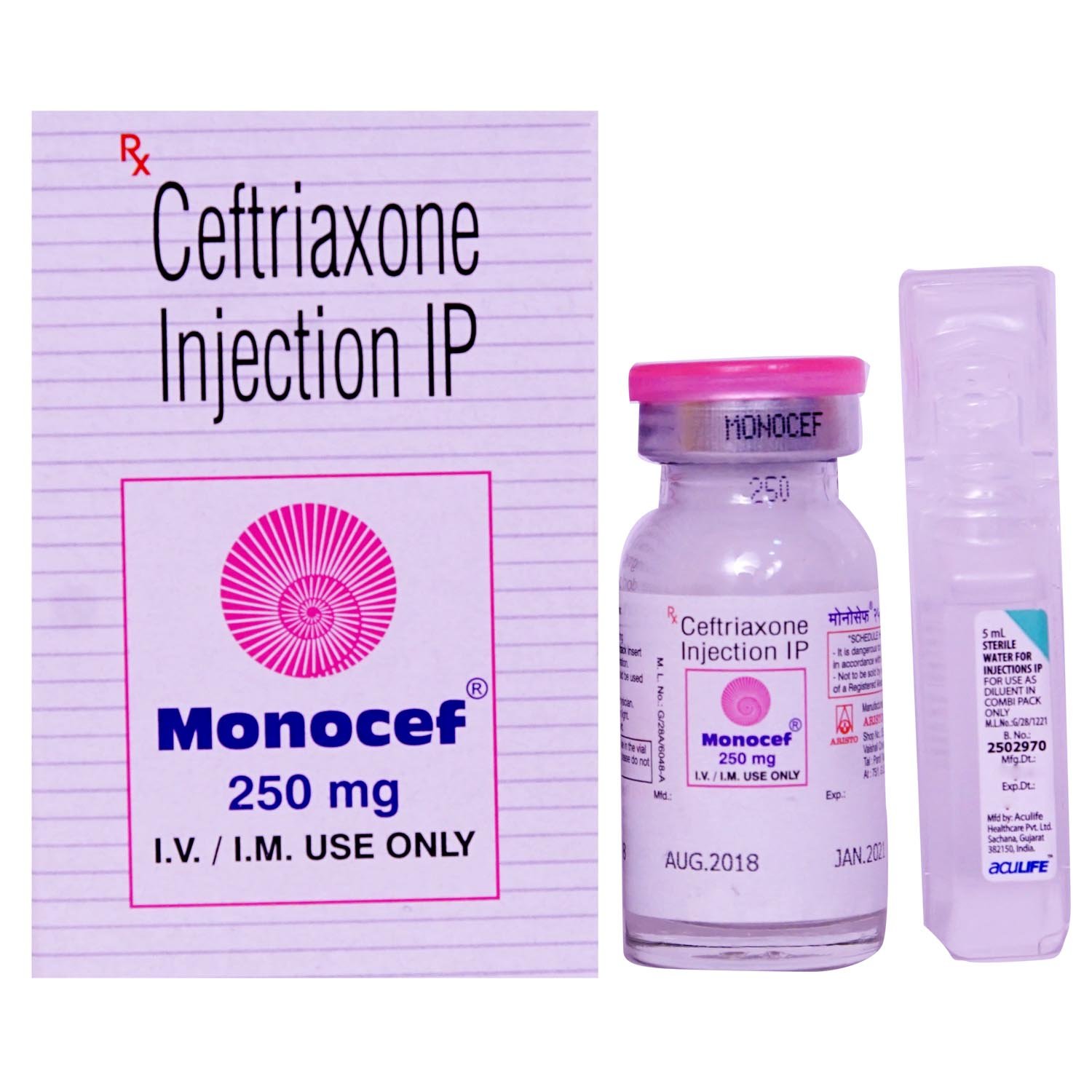
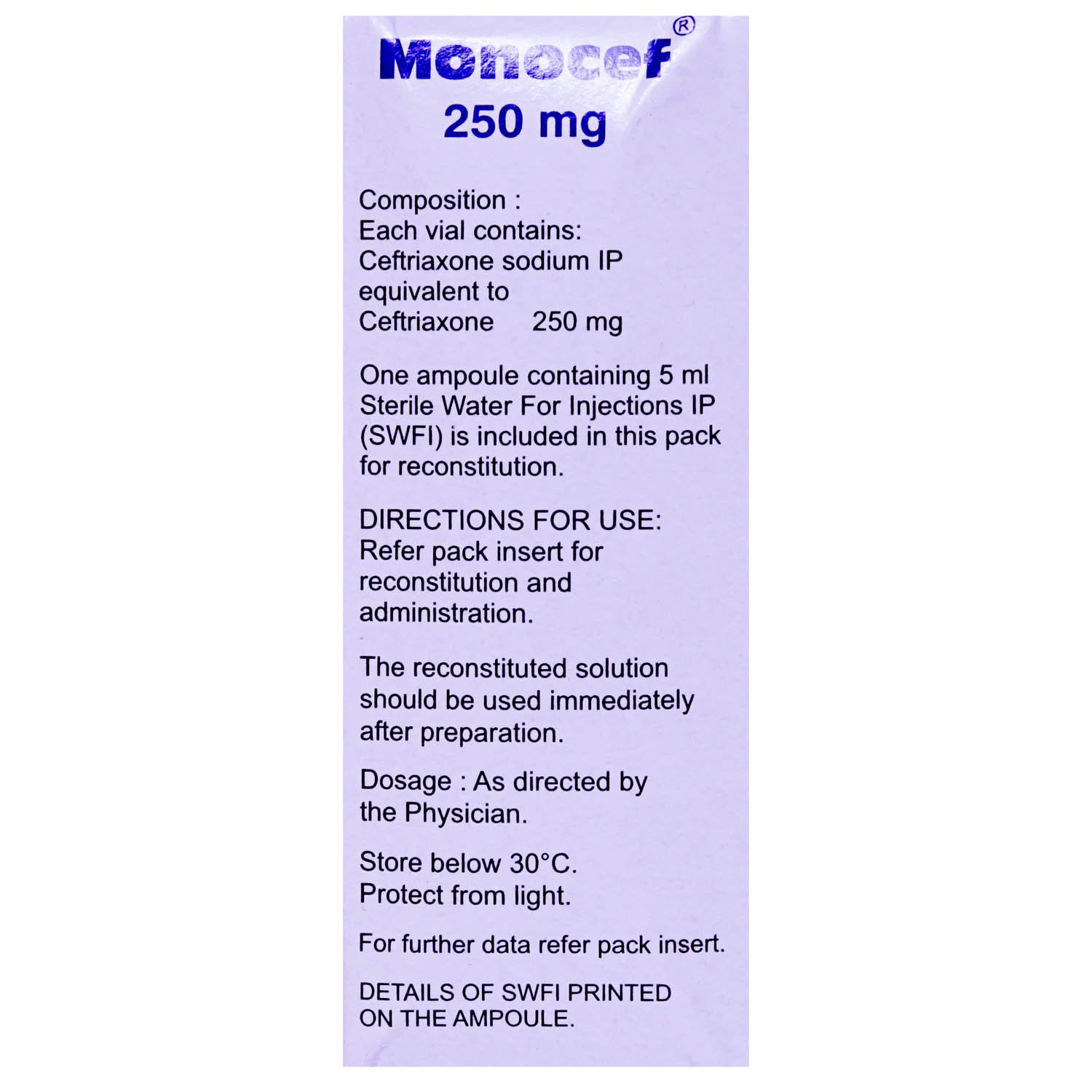
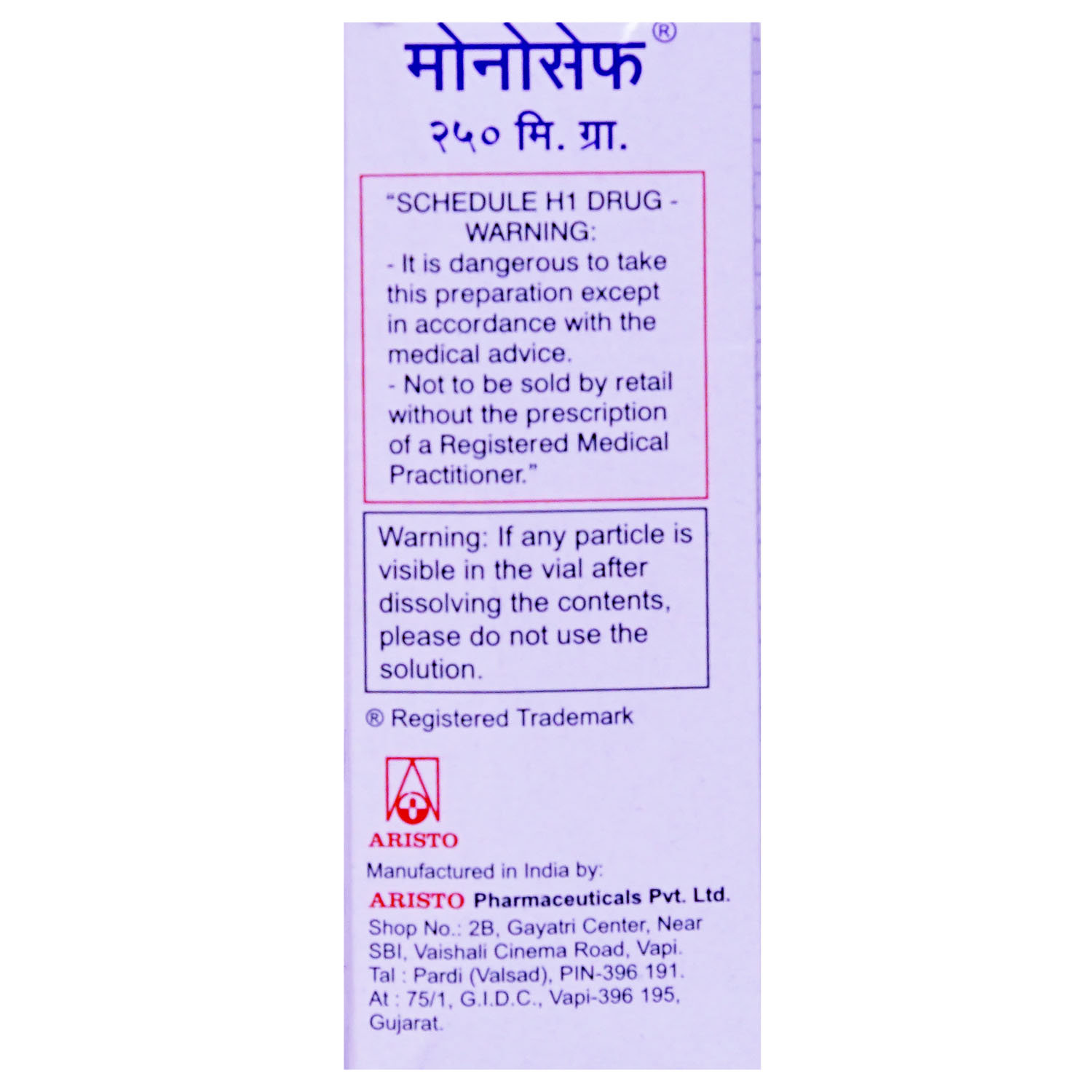
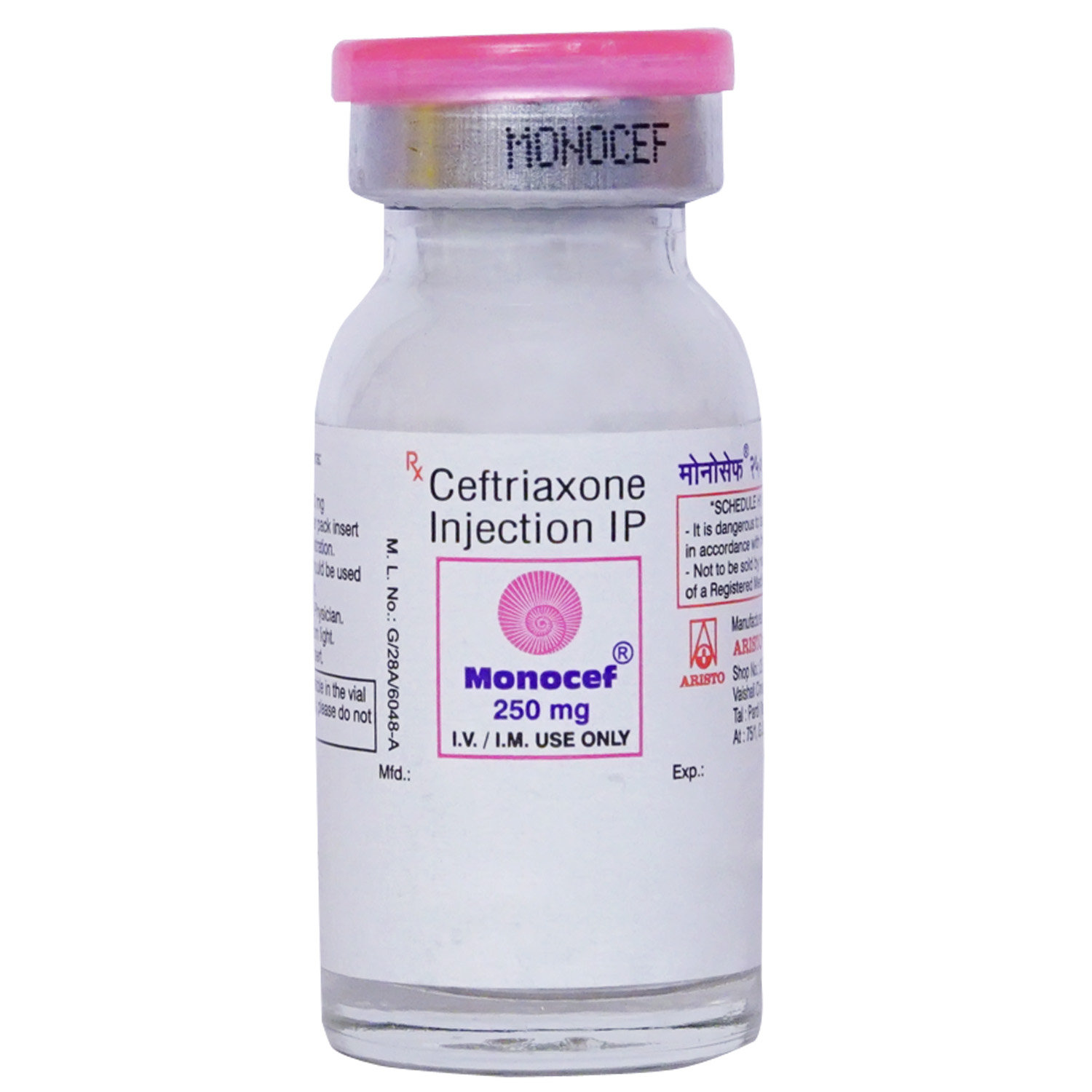
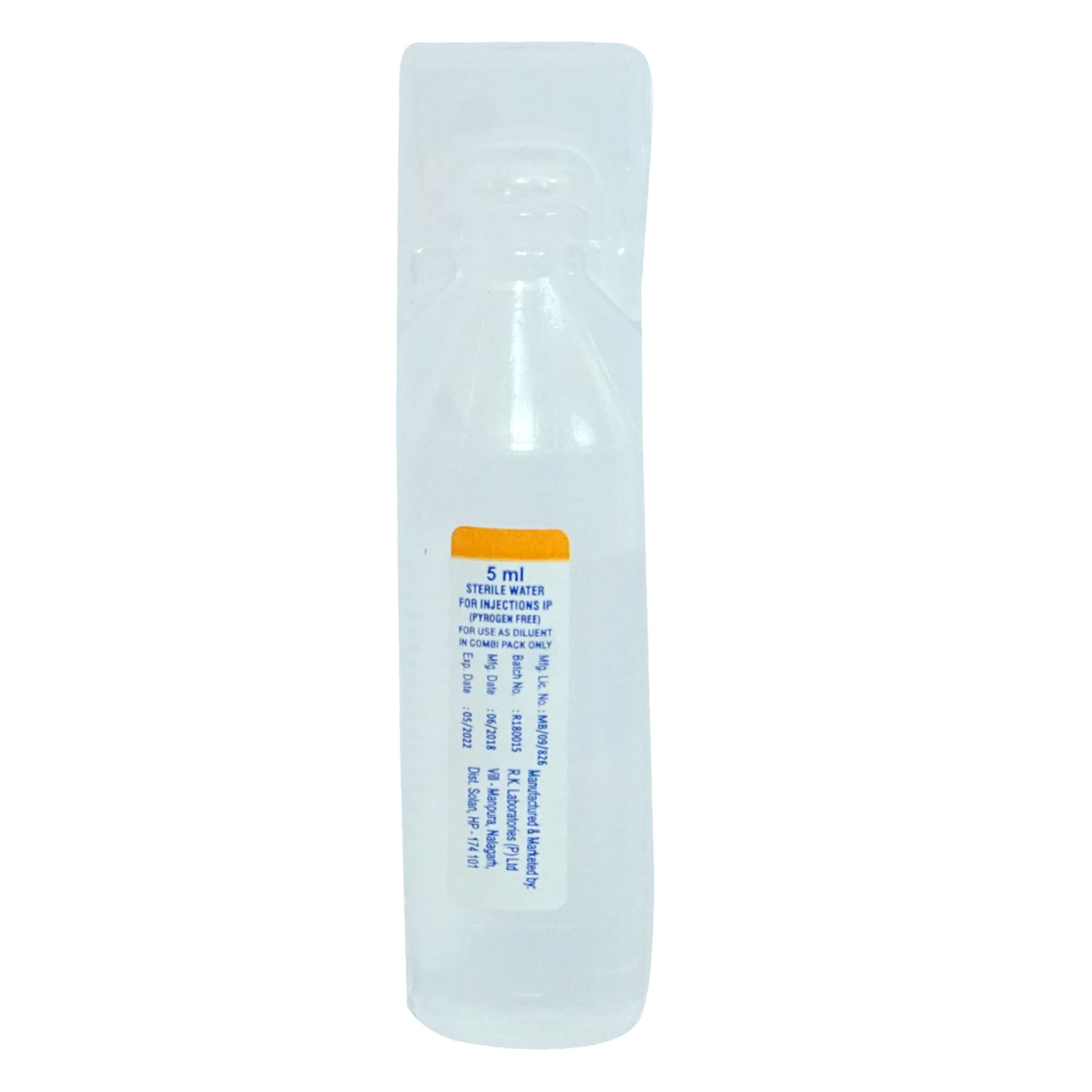





MRP ₹29.5
(Inclusive of all Taxes)
₹4.4 Cashback (15%)
Provide Delivery Location
Online payment accepted
 Prescription drug
Prescription drugWhats That
Composition :
Manufacturer/Marketer :
Consume Type :
Expires on or after :
Return Policy :
NPPA :
About Monocef 250 mg Injection
Monocef 250 mg Injection belongs to the group of cephalosporin antibiotics used to treat bacterial infections of the brain, lungs, middle ear, abdomen, urinary tract, kidneys, bones, joints, skin, soft tissues, blood, heart, chest, lime disease (caused by tick bites), and gonorrhoea (sexually transmitted disease). Bacterial infections are caused due to the multiplication of harmful bacteria inside or on the body.
Monocef 250 mg Injection contains 'Ceftriaxone', which works by interfering with the formation of bacterial cell wall, thereby kills the bacteria. Thus, Monocef 250 mg Injection helps in treating bacterial infection.
In some cases, Monocef 250 mg Injection may cause side-effects such as diarrhoea, rashes, changes in results of blood and liver tests, and abnormalities (increase/decrease) in the number of white blood cells and platelets. Although not everybody experiences these side effects, if they occur consult your doctor.
Talk to your doctor before taking Monocef 250 mg Injection if you have/had received calcium-containing products recently, had diarrhoea after taking antibiotics, inflammation of the bowel, kidney stones, or any other illness. Do not take antacids along with Monocef 250 mg Injection; maintain a gap of 2-3 hours between both. Consult your doctor if you are pregnant or breastfeeding. Monocef 250 mg Injection may cause dizziness, so be cautious while driving. Avoid alcohol consumption to prevent unpleasant side-effects.
Uses of Monocef 250 mg Injection
Directions for Use
Key Benefits
Monocef 250 mg Injection belongs to the group of antibiotic medicines called cephalosporins used to treat bacterial infections of the brain, lungs, middle ear, abdomen, urinary tract, kidneys, bones, joints, skin, soft tissues, blood, heart, chest, lime disease (caused by tick bites), and gonorrhoea (sexually transmitted disease). Monocef 250 mg Injection is a broad-spectrum antibiotic that is effective against gram-positive and gram-negative bacteria, aerobic and some anaerobic bacteria. Monocef 250 mg Injection works by preventing the formation of bacterial cell covering, which is necessary for their survival. Thereby, kills the bacteria and helps in treating and preventing the spread of infections.
Storage
- Drink plenty of water to stay hydrated.
- Avoid foods that can cause black stools, such as liquorice, blueberries, and iron-rich foods.
- Practice stress-reducing techniques like meditation, deep breathing, or yoga to help minimize stress-related digestive issues.
- Avoid taking medications that can cause black stools, such as iron supplements or bismuth subsalicylate.
- Monitor your stool colour, consistency, and frequency to identify any changes or patterns.
- Seek medical attention if you experience persistent or severe black stools, abdominal pain, or other symptoms.
- Get tested if your doctor suspects an underlying condition, such as gastrointestinal bleeding or ulcers.
- Make lifestyle changes, such as getting regular exercise and quitting smoking, to help improve overall digestive health.
- Chest pain may last for a while and needs immediate medical attention as it is a significant health issue to be attended to.
- Take rest and refrain from doing physical activity for a while, and restart after a few days.
- Try applying an ice pack to the strained area for at least 20 minutes thrice a day. Ice pack thus helps reduce inflammation.
- Sit upright and maintain proper posture if there is persistent chest pain. • Use extra pillows to elevate your position and prop your chest up while sleeping.
- Tell your doctor about the cough symptoms you're experiencing, which may be triggered by your medication.
- Your doctor may adjust your treatment plan by changing your medication, adding new medications, or providing guidance on managing your cough symptoms.
- Practice good hygiene, including frequent handwashing, avoiding close contact with others, and avoiding sharing utensils or personal items.
- Stay hydrated by drinking plenty of fluids, such as water, tea, or soup, to help thin out mucus and soothe your throat.
- Get plenty of rest and engage in stress-reducing activities to help your body recover. If your cough persists or worsens, consult your doctor for further guidance.
- Tell your doctor immediately if you experience shortness of breath after taking medication.
- Your doctor may adjust the medication regimen or dosage or give alternative medical procedures to minimize the symptoms of shortness of breath.
- Monitor your oxygen levels and breathing rate regularly to track changes and potential side effects.
- For controlling stress and anxiety, try relaxation techniques like deep breathing exercises, meditation, or yoga.
- Make lifestyle changes, such as quitting smoking, exercising regularly, and maintaining a healthy weight.
- Seek emergency medical attention if you experience severe shortness of breath, chest pain, or difficulty speaking.
- Follow up regularly with your doctor to monitor progress, adjust treatment plans, and address any concerns or questions.
Drug Warnings
Before starting Monocef 250 mg Injection, please inform your doctor if you are allergic to any of the components in Monocef 250 mg Injection or against any antibiotic. Talk to your doctor if you have/had received calcium-containing products recently, had diarrhoea after taking antibiotics, inflammation of the bowel, kidney stones, or any other illness. Consult your doctor if you are pregnant or breastfeeding. Avoid alcohol consumption while taking Monocef 250 mg Injection to prevent unpleasant side effects. Monocef 250 mg Injection may cause dizziness, so be cautious while driving. Inform your doctor about all the medicines you are taking and about your health condition to rule out any unpleasant side-effects.
Drug-Drug Interactions
Drug-Drug Interactions
Login/Sign Up
Co-administration of Calcium chloride with Monocef 250 mg Injection can increase the risk of side effects.
How to manage the interaction:
Taking Monocef 250 mg Injection with Calcium chloride is not recommended, but can be taken together if prescribed by a doctor. However, consult your doctor if you experience any unusual symptoms contact your doctor immediately. Do not discontinue any medications without consulting a doctor.
Co-administration of Calcium gluconate with Monocef 250 mg Injection can increase the risk of adverse effects.
How to manage the interaction:
Taking Monocef 250 mg Injection with Calcium gluconate is not recommended, but can be taken together if prescribed by a doctor. However, consult your doctor if you experience any unusual symptoms contact a doctor immediately. Do not discontinue any medications without consulting a doctor.
Taking the cholera vaccine after or along with Monocef 250 mg Injection may reduce the activity of the vaccine.
How to manage the interaction:
Although taking Monocef 250 mg Injection and Cholera, live attenuated together can evidently cause an interaction, it can be taken if your doctor has suggested it. To ensure adequate vaccine response, you should not receive cholera vaccine, live until at least 14 days after you complete your antibiotic therapy. In case you experience any unusual side effects, consult a doctor. Do not stop using any medications without a doctor's advice.
Drug-Food Interactions
Drug-Food Interactions
Login/Sign Up
Diet & Lifestyle Advise
- Antibiotics can alter the useful bacteria in the stomach, which help in digestion. Therefore, you are advised to take foods rich in probiotics such as yoghurt/curd, kefir, sauerkraut, tempeh, kimchi, miso, kombucha, buttermilk, natto and cheese.
- Eat fibre-rich food like whole grains, beans, lentils, berries, broccoli, peas and bananas.
- Avoid foods rich in calcium, grapefruit and grapefruit juice as they might hinder the absorption of antibiotics.
- Avoid consumption of alcohol and usage of tobacco.
Side Effects of Monocef 250 mg Injection
- Diarrhoea
- Rashes
- Changes in results of blood and liver tests
- Abnormalities (increase/decrease) in the number of white blood cells and platelets
Habit Forming
Therapeutic Class
All Substitutes & Brand Comparisons
RX
Out of StockNot for online saleC Trixon 250mg Injection
₹45
(₹8.1/ 1ml)
69% CHEAPERRX
Out of StockNot for online saleCuxone 250mg Injection
Cubit Healthcare
₹13
(₹11.7 per unit)
56% CHEAPERRX
Out of StockNot for online saleDemcef 250mg Injection
₹24
(₹21.6 per unit)
18% CHEAPER
Product Substitutes
Author Details
We provide you with authentic, trustworthy and relevant information
Drug-Diseases Interactions
Drug-Diseases Interactions
Login/Sign Up
FAQs
Drug-Drug Interactions Checker List
- FUROSEMIDE
- CHLORAMPHENICOL
Special Advise
- Monocef 250 mg Injection might affect the result of diagnostic tests like Coombs’ test (a test for some blood problems), galactosaemia (an abnormal build-up of the sugar galactose), and glucose tests. So tell your doctor that you are taking Monocef 250 mg Injection before undergoing these tests.
- Monocef 250 mg Injection must not be mixed or administered simultaneously with calcium-containing solutions, including total parenteral nutrition.
Disease/Condition Glossary
Bacterial infection: A bacterial infection is a condition in which harmful bacteria enter, multiply, and infect the body. Harmful bacteria produce chemicals known as toxins, which can damage tissue and cause illness. They can target any body part and multiply very quickly. Symptoms include fever, chills, and fatigue. Anyone can become infected with a bacterial infection. But, people with a weak immune system or taking immunosuppressive medicine are more prone to bacterial infection.

Have a query?
Buy best Infections & Infestation products by
Cipla Ltd
Macleods Pharmaceuticals Ltd
Alkem Laboratories Ltd
Lupin Ltd
Abbott India Ltd
Sun Pharmaceutical Industries Ltd
Mankind Pharma Pvt Ltd
Micro Labs Ltd
Aristo Pharmaceuticals Pvt Ltd
FDC Ltd
Intas Pharmaceuticals Ltd
Glenmark Pharmaceuticals Ltd
Ipca Laboratories Ltd
Torrent Pharmaceuticals Ltd
Zydus Healthcare Ltd
Biochem Pharmaceutical Industries Ltd
Zuventus Healthcare Ltd
United Biotech Pvt Ltd
Hetero Drugs Ltd
Emcure Pharmaceuticals Ltd
Alembic Pharmaceuticals Ltd
Indoco Remedies Ltd
Fusion Health Care Pvt Ltd
Dr Reddy's Laboratories Ltd
Leeford Healthcare Ltd
Cadila Healthcare Ltd
Wockhardt Ltd
Zydus Cadila
GlaxoSmithKline Pharmaceuticals Ltd
Morepen Laboratories Ltd
Blue Cross Laboratories Pvt Ltd
Cadila Pharmaceuticals Ltd
Converge Biotech Pvt Ltd
Elder Pharmaceuticals Ltd
Hetero Healthcare Pvt Ltd
Pfizer Ltd
AAA Pharma Trade Pvt Ltd
Gufic Bioscience Ltd
Mylan Pharmaceuticals Pvt Ltd
Corona Remedies Pvt Ltd
Wallace Pharmaceuticals Pvt Ltd
Apex Laboratories Pvt Ltd
Medishri Healthcare Pvt Ltd
Akumentis Healthcare Ltd
Alniche Life Sciences Pvt Ltd
Hegde & Hegde Pharmaceutica Llp
Veritaz Healthcare Ltd
Ranbaxy Laboratories Ltd
Koye Pharmaceuticals Pvt Ltd
Shreya Life Sciences Pvt Ltd
Overseas Health Care Pvt Ltd
Biocon Ltd
Indchemie Health Specialities Pvt Ltd
Medley Pharmaceuticals Ltd
Brinton Pharmaceuticals Ltd
J B Chemicals & Pharmaceuticals Ltd
Unifaith Biotech Pvt Ltd
Ajanta Pharma Ltd
Biochemix Health Care Pvt Ltd
Natco Pharma Ltd
Samarth Life Sciences Pvt Ltd
Unichem International
Laborate Pharmaceuticals India Ltd
Unipark Biotech Pvt Ltd
Zymes Bioscience Pvt Ltd
Indiabulls Pharmaceuticals Pvt Ltd
Neon Laboratories Ltd
Vasu Organics Pvt Ltd
DR Johns Lab Pharma Pvt Ltd
East West Pharma India Pvt Ltd
La Renon Healthcare Pvt Ltd
Medgen Drugs And Laboratories Pvt Ltd
Novartis India Ltd
Canixa Life Sciences Pvt Ltd
Icarus Health Care Pvt Ltd
Lincoln Pharmaceuticals Ltd
Celon Laboratories Pvt Ltd
Concept Pharmaceuticals Ltd
Klm Laboratories Pvt Ltd
Nicholas Piramal India Ltd
Systopic Laboratories Pvt Ltd
Yuventis Pharmaceuticals
Capital Pharma
German Remedies Ltd
Pristine Pearl Pharma Pvt Ltd
Unison Pharmaceuticals Pvt Ltd
Aurz Pharmaceutical Pvt Ltd
Clover Health Care Pharma
Kepler Healthcare Pvt Ltd
Allites Life Sciences Pvt Ltd
Auspharma Pvt Ltd
Intra Life Pvt Ltd
Jolly Healthcare
Linux Laboratories Pvt Ltd
Ozone Pharmaceuticals Ltd
Cachet Pharmaceuticals Pvt Ltd
Comed Chemicals Ltd
Delcure Life Sciences Ltd
Fresenius Kabi India Pvt Ltd
Khandelwal Laboratories Pvt Ltd
Alcohol
Safe if prescribed
Avoid consuming alcohol while taking Monocef 250 mg Injection to prevent unpleasant side-effects.
Pregnancy
Consult your doctor
Please consult your doctor if you are pregnant; your doctor will prescribe Monocef 250 mg Injection only if the benefits outweigh the risks.
Breast Feeding
Consult your doctor
Please consult your doctor if you are breastfeeding; your doctor will prescribe Monocef 250 mg Injection only if the benefits outweigh the risks.
Driving
Safe if prescribed
Monocef 250 mg Injection may cause dizziness, do not drive or operate heavy machinery if you feel dizzy.
Liver
Consult your doctor
Dose adjustment may be needed. Please consult your doctor if you have any concerns regarding this or if you have liver impairment/liver disease.
Kidney
Consult your doctor
Dose adjustment may be needed. Please consult your doctor if you have any concerns regarding this or if you have kidney impairment/kidney disease.
Children
Safe if prescribed
Monocef 250 mg Injection is safe for children if prescribed by a doctor. Monocef 250 mg Injection is not recommended for a premature baby, or a newborn baby who has jaundice (yellowing of the skin or eyes).






_0.jpg?tr=q-85)

